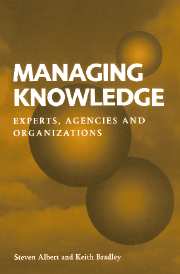Book contents
- Frontmatter
- Contents
- List of figures
- List of tables
- Introduction: the supply-side in context
- Part 1 Expert employees and their new organization
- 1 Trends in the labour market
- 2 Adaptations in the labour market and the expert employee
- 3 From the firm to the agency
- 4 Expert agency employment as a facilitator of intellectual capital
- 5 The temporal advantages of agency work for the expert employee
- 6 Taking stock
- Part 2 The labour market and the expert employee
- Appendix A Formal exposition of Winston model
- Appendix B Agency employment and search costs
- Notes
- References
- Index
3 - From the firm to the agency
Published online by Cambridge University Press: 23 November 2009
- Frontmatter
- Contents
- List of figures
- List of tables
- Introduction: the supply-side in context
- Part 1 Expert employees and their new organization
- 1 Trends in the labour market
- 2 Adaptations in the labour market and the expert employee
- 3 From the firm to the agency
- 4 Expert agency employment as a facilitator of intellectual capital
- 5 The temporal advantages of agency work for the expert employee
- 6 Taking stock
- Part 2 The labour market and the expert employee
- Appendix A Formal exposition of Winston model
- Appendix B Agency employment and search costs
- Notes
- References
- Index
Summary
It's quite clear to me that what you think of as a fault in yourself, your naturalness, your freedom, your spontaneity – that is precisely what people find attractive.
Turgenev, A Month in the CountryThis chapter describes the results of a punctuated adaptation of the labour market which was suggested in the previous chapter. Recall that it was organizational defence mechanisms which inhibit change and promote the more radical punctuated break. In such a change it is the expert employee's compensation package which plays the key role. Indeed, supply-side demands for specific compensation packages tend to destabilize employer–employee relationships. New compensation packages and instabilities which arise from them are at the heart of the punctuated break from the traditional firm or organization (compensation packages that include elements indicative of changes in opportunities that we outlined in chapter 1). This initial hypothesis raises several questions. It requires a more precise definition of the organizations from which individuals break away and a description of where such individuals end up once outside the organization.
In this chapter we examine the consequences of expert knowledge-based employees with regard to four widely accepted theories of the advantages of organizations. These are: (i) co-ordination (ii) monitoring (iii) economies of scale and (iv) regulation of the speed of production. If organizations develop because of their inherent advantages (i) to (iv), then it is reasonable to assume that employees' demands which undermine these can not co-exist. To the extent that these demands compromise an organization's inherent advantages, that organization's raison d'être necessarily diminishes.
- Type
- Chapter
- Information
- Managing KnowledgeExperts, Agencies and Organisations, pp. 49 - 63Publisher: Cambridge University PressPrint publication year: 1997



